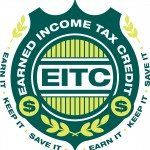It’s Officially Tax Season — Here’s An Earned Income Credit Checklist

Telling Tips is a series of articles from local experts to help you save money, make better decisions and plan for a better future.
In 2009, more than 26 million people received nearly $59 billion in earned income credits. Nice, right? Now, what if I told you that around 33 percent of the $59 billion distributed was fraudulent?
Due to this, the IRS is requiring tax preparers to verify, much more closely, that you are eligible for this credit. The tax preparer is subject to a penalty of $500 for each incorrectly prepared return; you are subject to governmental correspondence, and migraines, as well as having to return the money with interest and penalty, as well as not being able to claim the credit in the future.
In the past you had to just say “yes” or “no” to various questions. For example:
- Do you (and spouse) have a Social Security number allowing you to work, or is valid for EIC purposes?
- Were you a nonresident alien for any part of the year?
- Are you married / filing separately?
- Did you have investment income (interest, dividends or gross rents) of more than$3,200?
- Are you a qualifying child of another person?
Then there were some questions, again “yes” or “no,” about your child:
- Proper relationship: Son, daughter, etc.?
- Residency: Live with you more than half of the year?
- Age: Was the child younger than you? (You are 24 and have a 14 year old? Humm.)
The IRS relied upon the tax preparer to perform “due diligence,” and a few other hoops. This included signing a statement that the preparer “must not know or have reason to know that any information used to determine the taxpayer’s eligibility for, and the amount of, the EIC is incorrect.”
Additional Requirements For This Year
The preparer will ask you for some of the following records concerning your dependent:
- School records or statement: to prove the child’s address and yours are the same.
- Landlord or property management statement: to prove when you live.
- Health care provider statement: to prove you cover your dependent.
- Medical records: to prove address, and care.
- Child care provider records: to prove you paid child care to allow you to work.
- Social service records or statement: to prove the child lived with you.
- Place of worship statement: to prove you and the child were a family.
- Dependent disabled? You will need a doctor’s or other health care provide statement, or social services agency or program statement.
The preparer has to have proof of the documents that were relied upon to allow you the credit.
Are you self-employed, like a babysitter? You will have to prove your income:
- A form 1099.
- A record of your gross receipts: deposits into your bank account, for example.
- An income summary.
- An expense summary.
- Common sense: If you state you are earning $18,000 and have two children, you are going to be questioned as to how you are supporting the family — rent (receipts or landlord statement), electric (bills), food, transportation, and medical, to start. And if you are reporting income just sufficient to give you the maximum EIC allowance, you will be questioned very carefully this year.
The EIC program, unlike other programs, has no controls, which is why the IRS is focusing on preparers to control the fraud. (As an aside, this program is one of the main reasons that close to half of Americans pay absolutely no income tax.) And this is probably why your tax preparation fee is going to increase this year, and why, if you claim this credit, your refund will be delayed this year.
Have a good week.
Quip: Why don’t accountants count sheep to get to sleep?
Because if they lose count it would take three hours to find the error.
Joseph Reisman, of Joseph S. Reisman & Associates, has been serving tax prep and business accounting expertise from his Coney Island Avenue office for more than 25 years. Check out the firm’s website.



